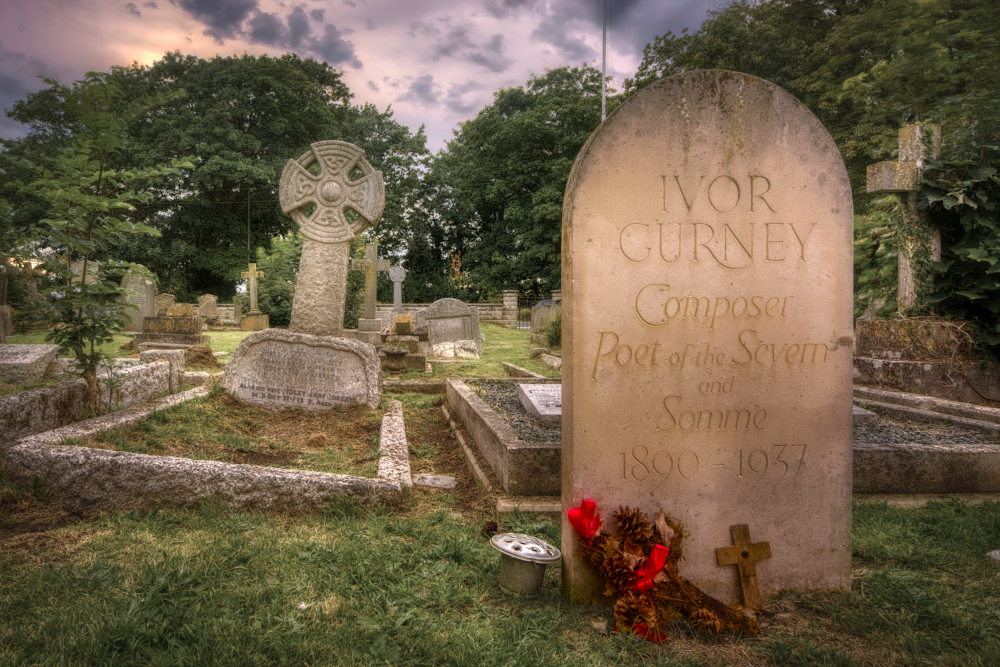
Ivor Gurney was a Gloucester-born composer and war poet. He battled both the German Empire on the fields of France and Flanders during the First World War and the demons that stalked his mind. Having spent his last years in the City of London Mental Hospital at Dartford in Kent, he returned to the Shire he loved after his death, to be buried in the graveyard of St. Matthew's Church at Twigworth, just outside Gloucester. Ivor was the subject of BBC Radio 3's composer of the week in 2014, featuring works of his specially recorded by the BBC. He is remembered, alongside Siegfried Sassoon, Wilfred Owen and Robert Graves, as one of the Great War poets.
Childhood
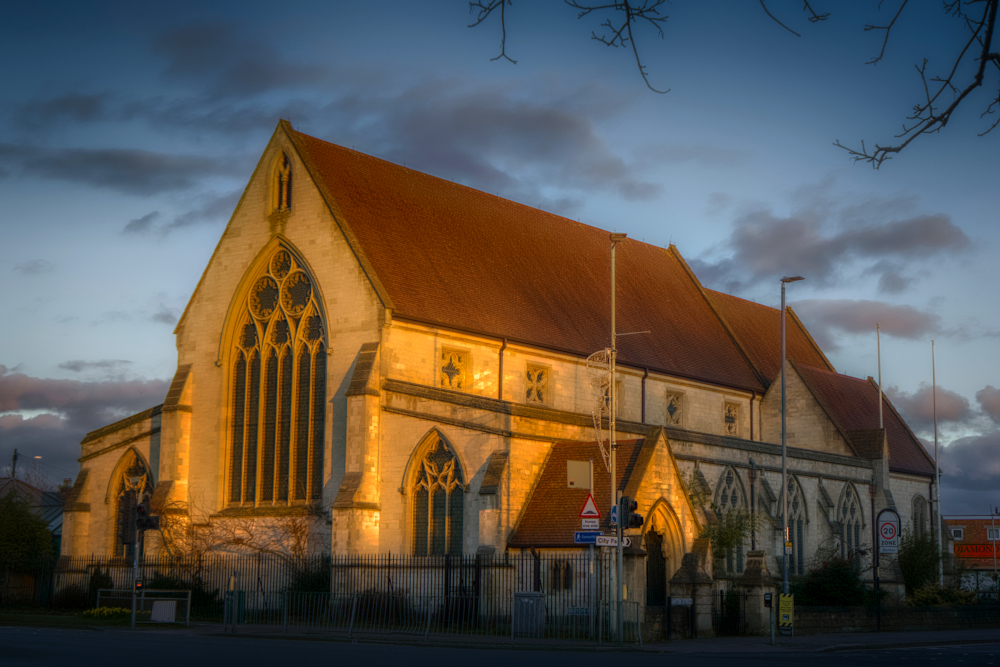
All Saints
Ivor was born the second of four children on 28 August 1890 in the family's tailor-shop home at 3 Queen Street in Gloucester, above the buried remains of the city's Roman wall off Eastgate Street. The marriage of his parents brought together two of the three natural treasures of Gloucestershire that would be such a staple of Ivor's poetry; his father David was a child of the Severn Valley around Maisemore, his mother Florence of the Cotswolds above Stroud.
Ivor was baptised 24 September 1890 at All Saints Church, built fifteen years earlier next to the Barton Street level crossing to serve the artisan estates that had sprung up during Gloucester's rapid expansion in the 19th century. No other family was present for the ceremony, and the vicar, Reverend Herbert Foster, stood in as one of Ivor's godparents, his curate, Alfred Cheesman, the other. Shortly after his birth, Ivor's family moved a short distance to slightly larger though still cramped Victorian premises at 19 Barton Street. At age six Ivor began attending the National School, located the north side of the railway on London Road.
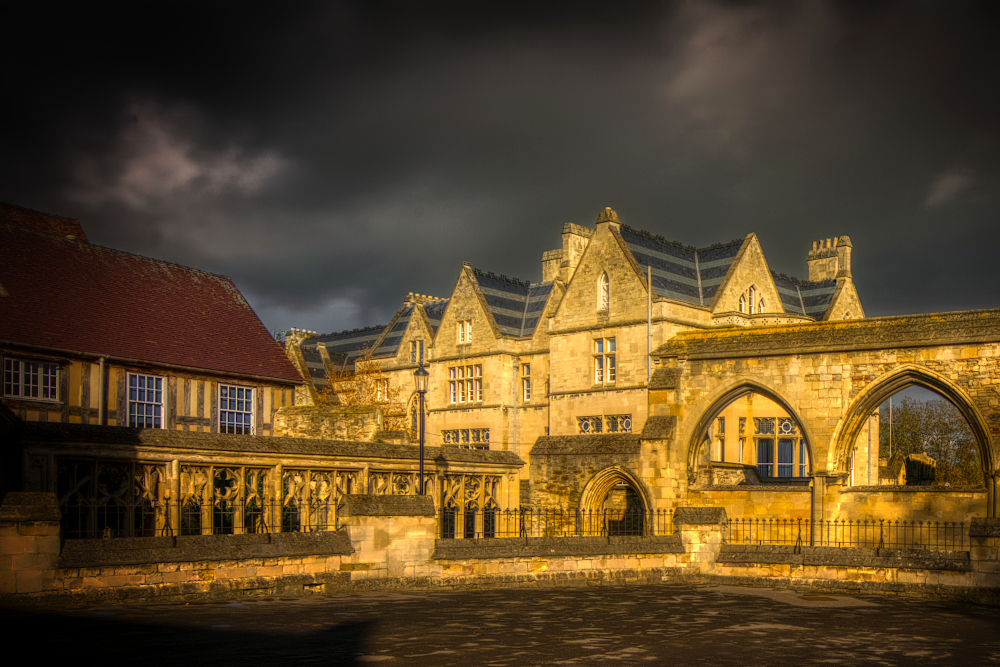
King's School
At the same time as starting elementary school, Ivor began attending Sunday School at All Saints, bringing him under the nurturing wing of his curatorial godfather. In 1898 Ivor joined the All Saints choir. Cheesman, recognising a musical ability in his protégé that went beyond a good voice, encouraged Ivor to apply for a choral scholarship at Gloucester Cathedral. Success in 1900 meant that Ivor became a pupil of King's School alongside future poet F.W. Harvey, though the two would not begin their lifelong friendship for another eight years.
Ivor's teenage years established the threads that would be woven into his life. Encouraged by Emily and Margaret Hunt, widely travelled friends of the family, he began composing music in 1904. The two sisters also introduced Ivor to the beauty of the Shire in the Cotswolds above Gloucester, and he would accompany his father on the weekly, eight-mile walk to his grandparents in Maisemore and enjoy family walks along canal and river.
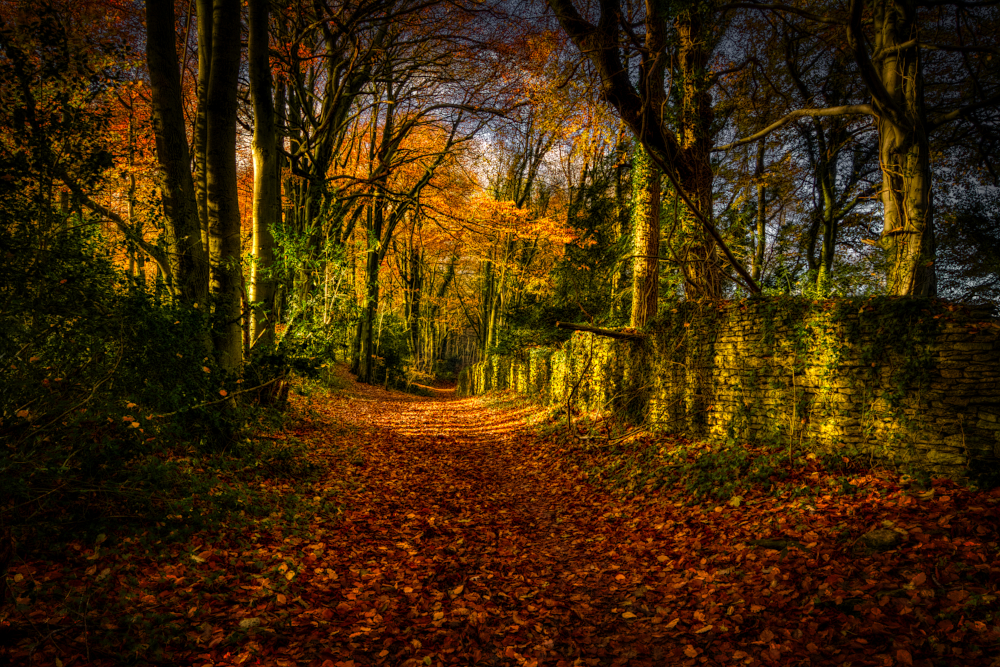
"And Cranham, Cranham trees, And blaze of Autumn hues"
Ivor began studying music under the cathedral organist in 1906, alongside Ivor Novello and Herbert Howells. Two years later, F.W. Harvey joined Howells in Ivor's inner circle of close friends after meeting on a tram in Gloucester. Ivor was readily welcomed at The Redlands, Harvey's large farmhouse family home in Minsterworth, and found in Harvey a kindred spirit who shared his love of music and poetry, of sport and of sailing on the Severn.
Composer
Whilst Harvey gravitated towards poetry, Ivor, after hearing Ralph Vaughan Williams's Fantasia on a Theme by Thomas Tallis performed at Gloucester Cathedral in 1910 as part of the Three Choirs Festival, was determined to become a composer.

"I'll marvel how sweet's the air down Framilode way"
In 1911 he won an open scholarship to the Royal College of Music in London. He took a room in Fulham and a job as church organist in High Wycombe. His studies were interrupted in 1913 by a bout of depression that sent him back to the Shire for a few weeks. He spent his time living and working in Framilode, a riverside village at the beginning of the Severn's great horse-shoe loop south-west of Gloucester.
Poet, Warrior
Ivor's return to his studies in July 1914 was brief, interrupted this time by the outbreak of the First World War. In August he tried to enlist alongside Harvey in the 1/5th Battalion, Gloucestershire Regiment. Rejected for poor eyesight, he was more successful the following February, when he was accepted into the regiment's 2/5th Battalion.
During its training, the battalion was part of Central Force, the mobile element of the UK's home defence army, and was stationed first at Northampton then later at Chelmsford. A year after Ivor joined it, the battalion moved to Salisbury Plain to complete its training preparatory to its deployment to France in May 1916.
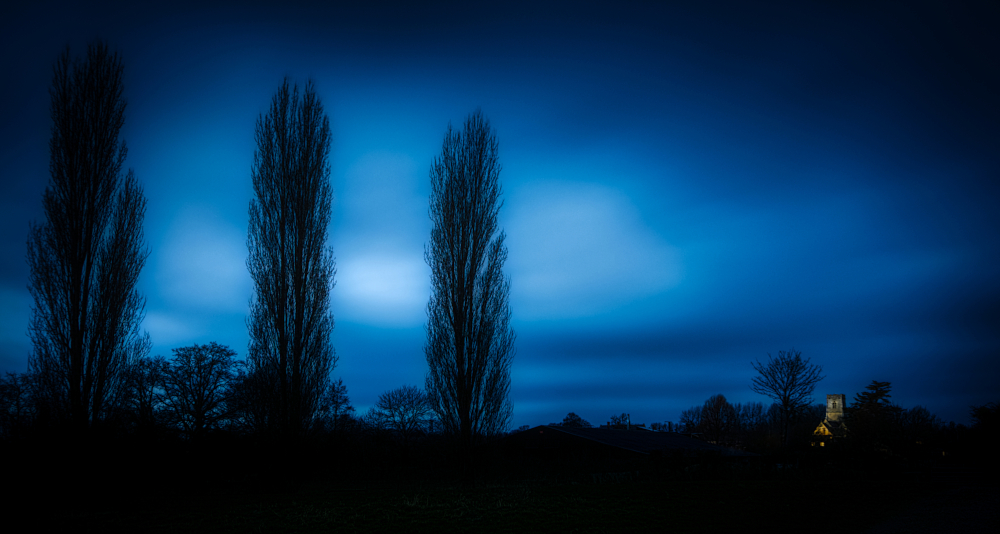
"Making trees like German shadows"
With the opportunity to compose severely curtailed in the trenches, Ivor turned his creative energies to writing poetry. He had had only fleeting opportunities to meet with Harvey – the last of them the morning of the day on which Harvey was captured while reconnoitring no-man's land for a raid he was due to lead – but both men were contributors to the Fifth Gloucester Gazette. The trench journal was produced by the 1/5th Battalion and foreshadowed the more famous Wipers Times. It was hailed by the Times Literary Supplement as "the oldest and most literary of the British trench journals."
Ivor's poetry was included alongside that of Harvey in The Muse in Arms, a 1917 anthology of war poetry which also included the works of Siegfried Sassoon, Robert Graves and Rupert Brooke. In October the same year a collection of Ivor's war poetry, Severn and Somme, was published.
he That dwells in shadows
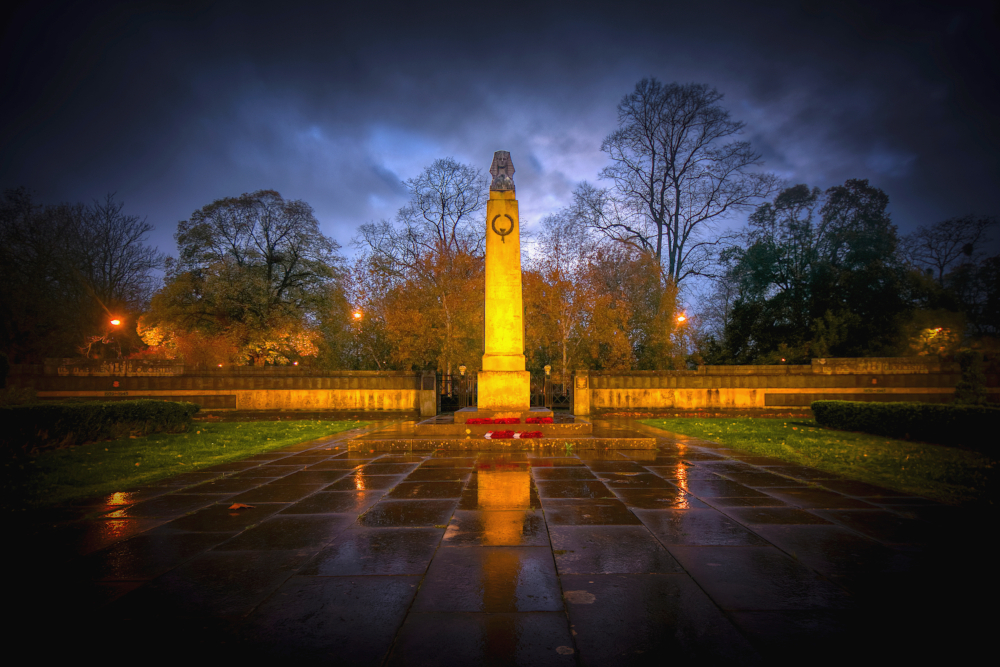
"And tell men, unbegotten as yet, the story Of your sad glory"
Soon after Severn and Somme was published Ivor was battling something more dangerous than the enemy gas that had invalided him back to the UK. Having recovered from his war wounds, he was hospitalised again with depression. On 19 June 1918, while being treated at Warrington for a nervous breakdown, he wrote to friends, "I know you would rather know me dead than mad." He was found wandering the canal, searching for the courage to end it all.
Ivor was discharged from the army in October 1918 and, with the help of his friends – among them Harvey, who had returned from captivity in February 1919 – was gradually able to find a way out of the deep black hole into which he had descended. He returned to the Royal College of Music in the autumn of 1919, the same year a second collection of his poetry, War's Embers, was published.
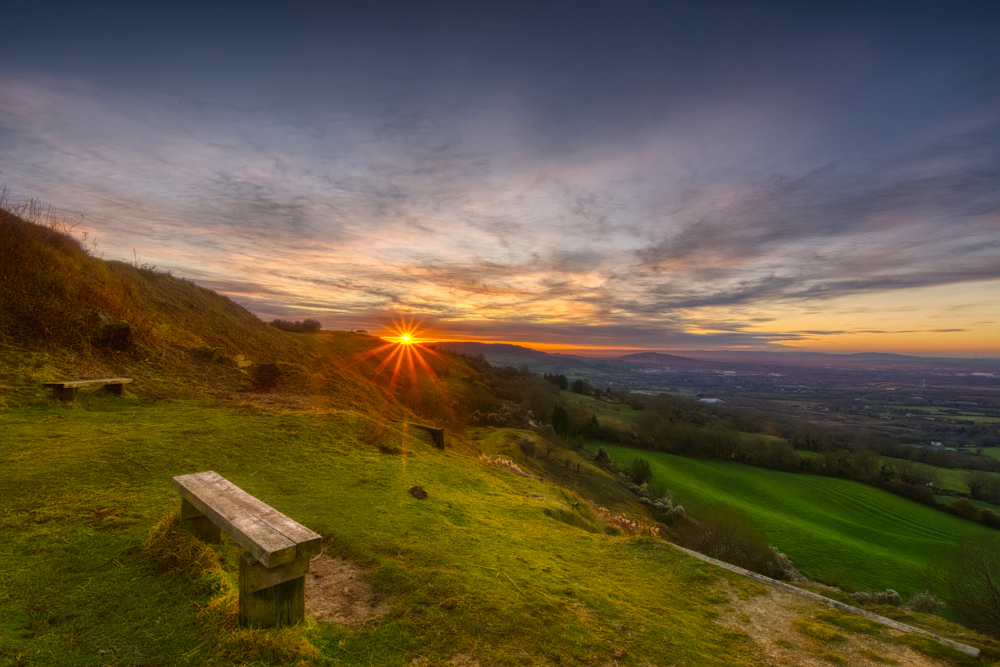
"And take my sentence on sheer-down Crickley Hill"
The years 1920–1921 were Ivor's most creative, musically his most productive. Although studying in London, he found inspiration in his beloved Shire and energy through physical exertion. He would walk through the night from London to Gloucestershire, and in 1921 he took a labouring job at Dryhill Farm on the lower slopes of Crickley Hill on the edge of the Cotswolds above Gloucester.
But the creativity unleashed by Ivor's exertions could not silence the voices or absorb the radio waves he believed were assailing him, and his behaviour became increasingly erratic. Ivor gave up his studies at the Royal College of Music in 1922 and returned to the Shire. He stayed with relatives at Longford and in Gloucester, an imposition that did not go down well with them, and took a series of jobs.
In September 1922 Ivor was certified insane and admitted to Barnwood House Mental Hospital in Barnwood, which at that time lay just outside the city. He wrote letters pleading for release or death, and in December, after a night-time attempt to escape in his pyjamas, he was transferred to the City of London Mental Hospital at Dartford in Kent. While the quality of his musical composition deteriorated during these years, the internal conflict he endured generated some of his best war poetry.
Ivor refused to walk the hospital grounds. They simply weren't the Shire he loved, and "he would have nothing to do with that travesty of something sacred to him." Ivor wrote his last known piece of music in January 1927, his last known poem in March 1929. He died of tubercolosis on 26 December 1937.
And on the Day of Days
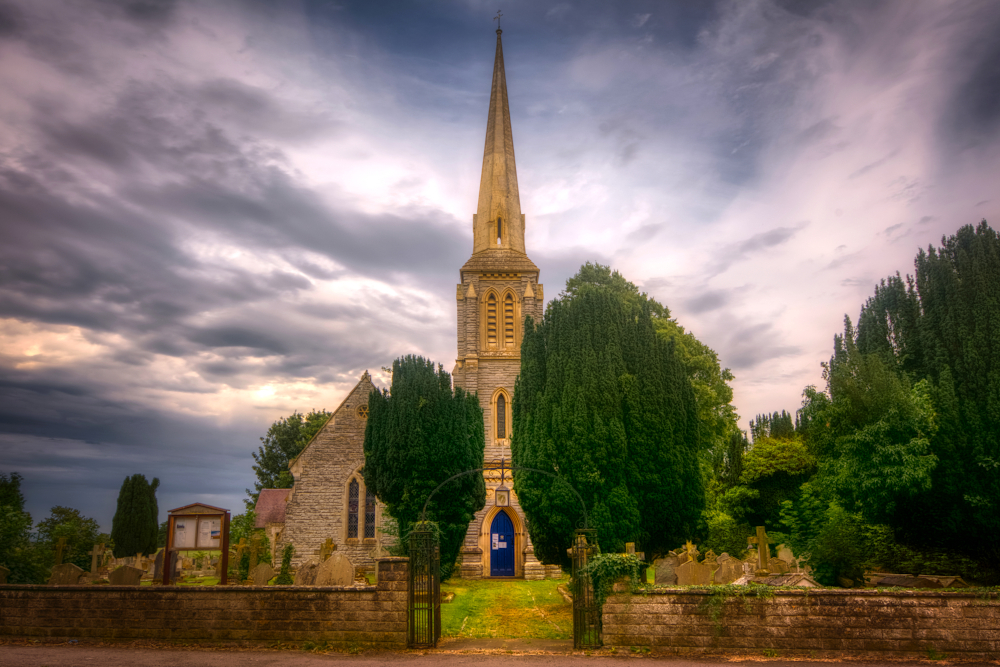
St. Matthew's, Twigworth
In death Ivor was reunited with his beloved Shire. His funeral on 31 December at St. Matthew's Church, Twigworth, just outside Gloucester, was officiated by his godfather, Cheesman, now vicar of St. Matthew's and also a Canon of Gloucester Cathedral. Herbert Howells, with whom Ivor had determined to become a composer that day of the Three Choirs twenty-seven years earlier, played the organ. Amongst the congregation was the composer Gerald Finzi, who became instrumental in preserving Ivor's music and poetry, some 330 songs and around 1,500 poems. As the coffin was lowered into the ground, Harvey dropped a sprig of rosemary to which he had attached a card on which was written "Rosemary for Remembrance."
Gurney's Gloucester Today
The house in which Ivor was born was demolished in the 1930s to make way for the enlargement of a Co-op store. In 1980 the construction of a new store for Boots the Chemists on the site of the Co-op transformed Queen Street into the covered passage of Queen's Walk it is today. A blue plaque commemorating Ivor is attached to a pillar of the Boots building at the Eastgate Street entrance to Queen's Walk, close to the viewing chamber where the remains of the city's eastern defences that ran under his birthplace can be seen.
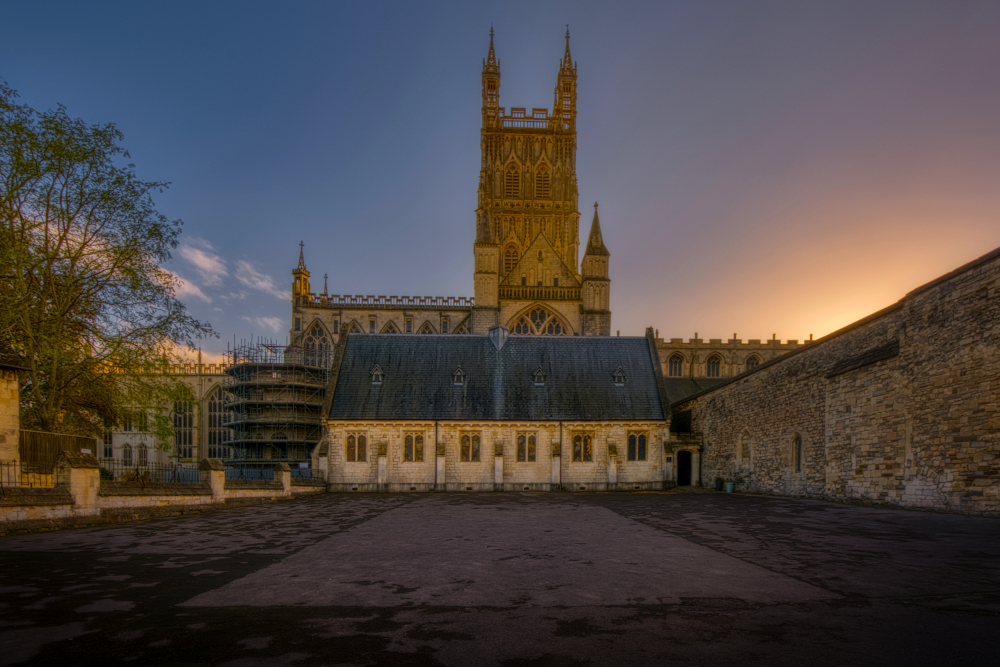
Kings's School Ivor Gurney Hall
In the post-war period Barton Street became a continuation of Eastgate Street. While what was originally no. 18 Barton Street, now nos. 62–64 Eastgate Street, still stands on the south side, the Gurney family home at no. 19 opposite has been replaced by a modern office building. Ivor's first school, the National on London Road, was closed in 1962, and the site has since been redeveloped into retail units the opposite side of the road to a petrol station.
All Saints Church was closed 1989, and the building, listed grade II by Historic England, now serves as a community centre. St. Matthew's Church at Twigworth closed after holding its last service on 15 December 2019.
Memorials
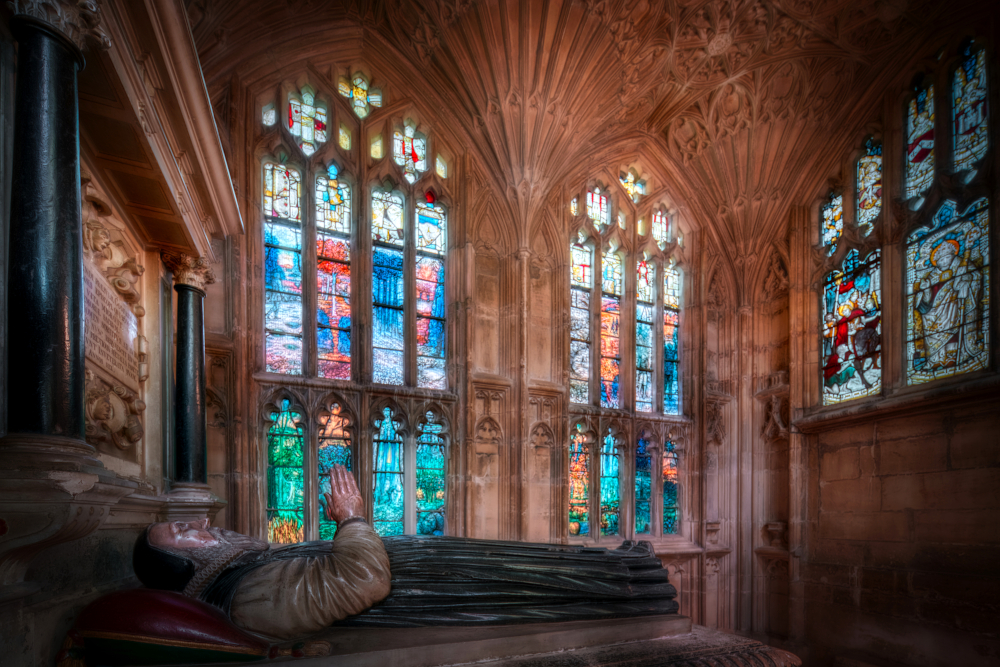
Ivor Gurney window (centre) at Gloucester Cathedral
Sometime after his burial, Ivor's original gravestone was damaged and replaced with the current stone. The original, on which are inscribed the words "a lover and maker of beauty", is stored in the church.
Ivor is, alongside Siegfried Sassoon, Wilfred Owen and Robert Graves, among the sixteen Great War poets whose names are inscribed on a slate stone unveiled in 1985 in Poet's Corner at Westminster Abbey. In Gloucester, he is memorialised in stained glass in St. Mary de Lode, dedicated in 2000, and in the north chantry of the Lady Chapel at Gloucester Cathedral, installed in 2013.
Ivor is recognised in a memorial at Sint-Juliaan, Belgium, near where he was gassed in 1917. In 2005 the Ivor Gurney Memorial Park, his poetry inscribed into the paving, was opened in Gloucester Park. The Candle, a towering piece of public art installed 2010 at Victoria Basin in Gloucester Docks, is inscribed around its base with words from Ivor's poem Requiem.
Ivor is also remembered in the cathedral precinct by the Ivor Gurney Hall, the performing arts facility of his alma mater, King's School.
Quoted poetry
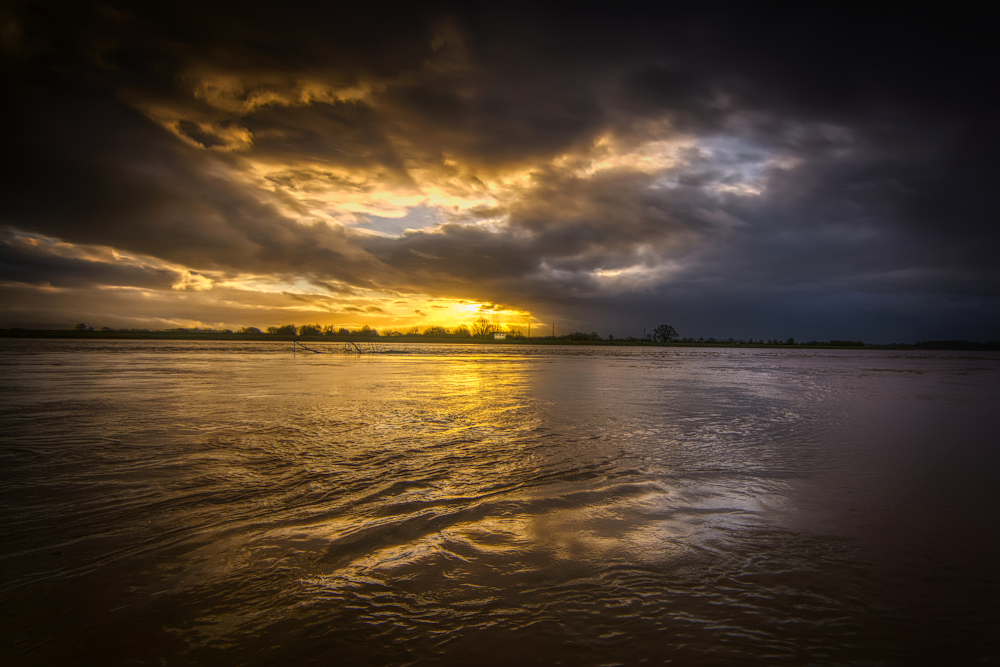
And who loves joy as he
That dwells in shadows?
Do not forget me quite,
O Severn meadows.
And Cranham, Cranham trees,
And blaze of Autumn hues
And on the Day of Days, the Judgement Day,
The Word of Doom awaiting breathless and still,
I'll marvel how sweet's the air down Framilode way,
And take my sentence on sheer-down Crickley Hill.
And tell men, unbegotten as yet, the story
Of your sad glory
Privates Ernest Skillern and John Hall served alongside Ivor in the 2/5th Battalion. They were killed in action in June 1916, and are among the 1,069 fallen commemorated on the 5th Battalion war memorial at Gloucester Park.
Making trees like German shadows
Pour out your light, O stars
The Ordeal of Ivor Gurney
Order of Battle of Divisions, Part 2
The Lost Novel of FW Harvey: A War Romance